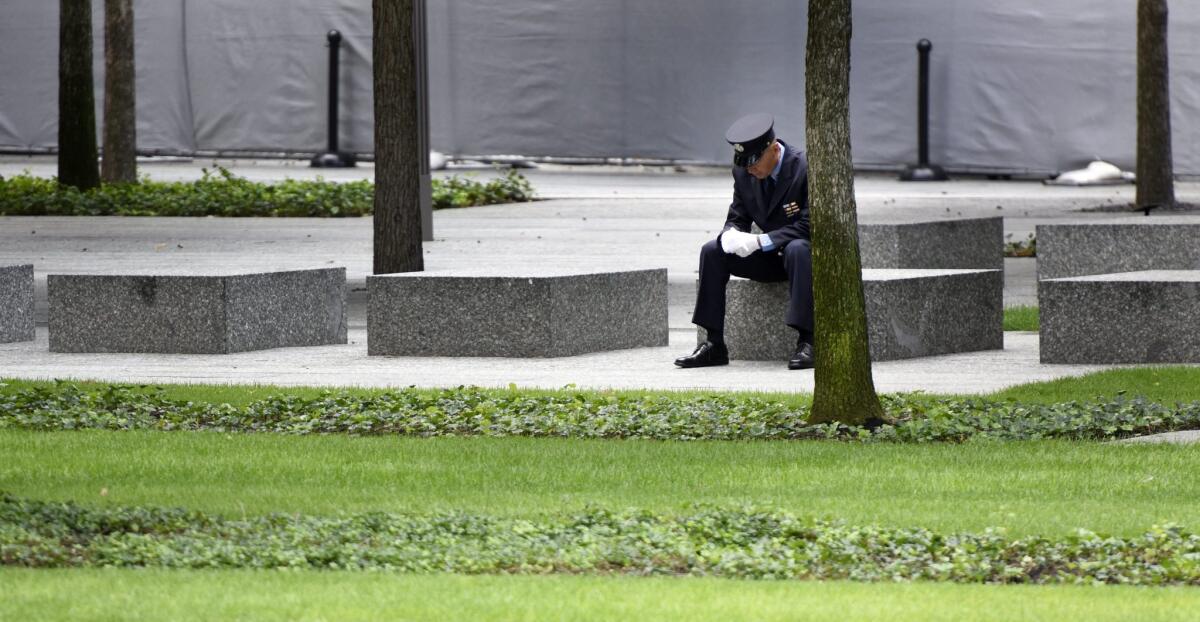Opinion: The 9/11 legacy is at once national and personal

A firefighter listens as the names of victims of the 9/11 terror attacks are read Friday at the National September 11 Memorial in New York City.
Fourteen years ago this morning I was herding our two young sons through breakfast and off to school before heading to work myself when my wife called. There had been a report on the radio during her short commute to work about a plane flying into the World Trade Center in New York City. She wasn’t in the car long enough to get many details, but thought, since I was a staff writer for The Times and a news junkie, I’d want to know.
So I flipped on the TV to see footage replaying of the first plane hitting the tower, then, as it happened, the second one hitting the second tower (that’s how I’ve remembered it; more on that momentarily). My sons, 11 and 7 years old at the time, watched with me, then started arguing about exactly what type of Air Force jets were crisscrossing the sky on TV, missing for the moment the unfolding nature of the event itself.
We in the media have a habit of revisiting major news events like the 9/11 terror attacks on significant anniversaries – five years, 10 years, 25 years. This is the 14th anniversary of that dreadful day, so it won’t be getting the “major anniversary” treatment, which is fine, really, since I suspect for most of us the memories are fresh anyway and live on differently from other searing moments of national pain.
I wonder, for instance, how many of us recall what we were doing when Timothy McVeigh detonated a truck bomb at the Alfred P. Murrah Federal Building in Oklahoma City? The 20th anniversary of that flew by this past April 19 with relatively little retrospective coverage. Of course, that act of domestic terrorism didn’t spawn wars and the curtailing of civil liberties that followed the 9/11 attacks. It’s as though the hijacked planes and ensuing carnage overwhelmed our collective memory of that earlier cataclysmic crime.
As the twin towers burned on my TV that morning, I called an editor at The Times to make sure he knew (he did) and asked what they wanted me to do. I live about four miles from Orange County’s John Wayne Airport, so was dispatched there to see what was going on. By the time I arrived, all U.S. air space had been closed and all flights grounded. Inside, a few confused people who had planned to fly that morning wandered around, hoping the closure would be brief (it wasn’t). The check-in desks for the airlines were abandoned, some now behind partially closed security gates. When I could find someone in an airline uniform, they had no information and no answers; all questions had to be directed to corporate headquarters. There was, everywhere, shock and confusion, with an overlay of fear – what happened, by whom, why, and was it, please, over, or were there more attacks poised to be launched?
The nation eventually learned what happened, and we live with the consequences every day. Tighter security screenings at airports. Persistent prejudice against those who practice Islam. The wars in Afghanistan and Iraq, and American streets sprinkled with the homeless veterans who fought them. A military-industrial complex of astounding (though lately shrinking) scope.
There is no forgetting something as calamitous as the 9/11 attacks, which is why Friday’s ceremonies were simultaneously necessary as acknowledgment and unnecessary as a reminder. Individual memory, though, is more malleable. Did we really see what we think we saw? The visuals of that morning have been replayed so often it can be hard to separate the memory of the moment – what happened as we watched in shock – from the memory of the replay. As I researched this morning at the timing of the attacks it seems unlikely that I saw the second plane hit the tower in real time, though that’s how I remember it. It is most likely that I saw the first tower collapse in real time, but not the second, because by then I was whisking my sons off to school on my way to the airport.
My sons’ memories are a bit more fragmentary, given their young age at the time, but they recall quickly figuring out that there was more happening on the TV screen that day than some military jets scrambling around the skies over Manhattan, and burning buildings, the significance of which was still unknown. This morning my younger son, Andrew, says he remembers watching the fighter jets and being confused, and then later as he learned more during the school day, being afraid and “freaked.”
My older son, Michael, recalls getting to school and learning that a friend’s aunt was booked on one of the hijacked planes and the family was panicking because no one had heard from her. A teacher let him and the friend use a classroom computer – no schoolwork was getting done anyway – to find what they could online. They discovered an information phone number for families, got word to the friend’s parents, who soon learned that the aunt had given up her seat and wasn’t aboard.
Now adults (25 and 21), both sons have lived the bulk of their lives under the shadow of war against foreign armies and stateless terrorist organizations, and in a culture that celebrates violence like none other in the world. It has affected the political worldview of Andrew, but his interest in politics and policy at this juncture trails his passion for jazz (he plays bass), which he is studying in hopes of making it a career.
Michael, the older son, recently returned from two years in the Peace Corps. He has pursued martial arts for several years and likely will head next to grad school to prepare for a career in national security work. He attributes both interests to growing up in the post-9/11 world. He is of a generation, he says, that was “never made to feel invulnerable.”
That’s the daily legacy of the terror attacks, that sense of vulnerability. And it resonates far beyond an annual, yet important, moment of silence.
Follow Scott Martelle on Twitter @smartelle.
More to Read
A cure for the common opinion
Get thought-provoking perspectives with our weekly newsletter.
You may occasionally receive promotional content from the Los Angeles Times.







